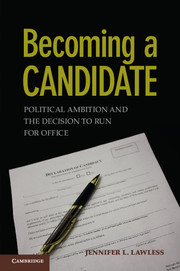Book contents
- Frontmatter
- Contents
- List of Tables
- List of Figures
- Acknowledgments
- 1 Mudslinging, Money-Grubbing, and Mayhem
- 2 The Decision to Run for Office
- 3 Political Ambition in the Candidate Eligibility Pool
- 4 Barack Obama and 18 Million Cracks in the Glass Ceiling
- 5 You Could Be President Someday!
- 6 On-the-Job Training
- 7 You Think I Should Run for Office?
- 8 Biting the Bullet
- 9 Future Patterns of Candidate Emergence and Studies of Political Ambition
- Appendix A The Citizen Political Ambition Panel Study
- Appendix B The First Wave Survey (2001)
- Appendix C The Second Wave Survey (2008)
- Appendix D The First Wave Interview Questionnaire
- Appendix E The Second Wave Interview Questionnaire
- Appendix F Coding of Variables
- Works Cited
- Index
3 - Political Ambition in the Candidate Eligibility Pool
Published online by Cambridge University Press: 05 June 2012
- Frontmatter
- Contents
- List of Tables
- List of Figures
- Acknowledgments
- 1 Mudslinging, Money-Grubbing, and Mayhem
- 2 The Decision to Run for Office
- 3 Political Ambition in the Candidate Eligibility Pool
- 4 Barack Obama and 18 Million Cracks in the Glass Ceiling
- 5 You Could Be President Someday!
- 6 On-the-Job Training
- 7 You Think I Should Run for Office?
- 8 Biting the Bullet
- 9 Future Patterns of Candidate Emergence and Studies of Political Ambition
- Appendix A The Citizen Political Ambition Panel Study
- Appendix B The First Wave Survey (2001)
- Appendix C The Second Wave Survey (2008)
- Appendix D The First Wave Interview Questionnaire
- Appendix E The Second Wave Interview Questionnaire
- Appendix F Coding of Variables
- Works Cited
- Index
Summary
The manner in which most elective positions in the United States are structured is geared to allow competent, politically interested individuals to step forward and serve as representatives of the people. In fact, more than two centuries ago, the founders worked to create a national legislature that allowed successful citizens to serve their nation for a few years. The notion of career politicians was not something they envisioned; it was something against which they warned. Weary of the power of hereditary succession and monarchical rule, for instance, Thomas Paine (1776) highlighted the ills of a ruling class:
Men who look upon themselves born to reign, and others to obey, soon grow insolent. Selected from the rest of mankind, their minds are early poisoned by importance; and the world they act in differs so materially from the world at large, that they have but little opportunity of knowing its true interests, and when they succeed in the government are frequently the most ignorant and unfit of any throughout the dominions.
Alexander Hamilton (1787) also argued against career politicians, noting that “the natural cure for an ill-administration, in a popular or representative constitution, is a change of men.” During the Constitutional Convention, Benjamin Franklin (1787) took the sentiment even further when he asserted that professional politicians were confined to an undesirable “state of servitude”:
It seems to have been imagined by some that the returning to the mass of the people was degrading the magistrate. This he thought was contrary to republican principles. In free Governments the rulers are the servants, and the people their superiors and sovereigns. For the former therefore to return among the latter was not to degrade but to promote them. And it would be imposing an unreasonable burden on them…not allow them to become again one of the Masters.
Since the time of the founding, therefore, the U.S. political system's success has relied on a large number of civic-minded citizen legislators.
- Type
- Chapter
- Information
- Becoming a CandidatePolitical Ambition and the Decision to Run for Office, pp. 31 - 48Publisher: Cambridge University PressPrint publication year: 2011



